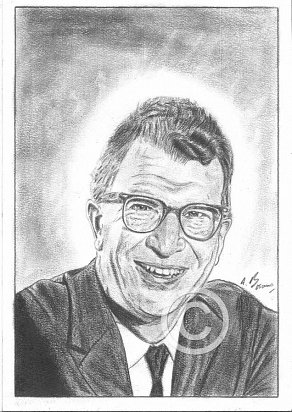Dave Brubeck
Pencil Portrait by Antonio Bosano.

Shopping Basket
The quality of the prints are at a much higher level compared to the image shown on the left.
Order
A3 Pencil Print-Price £45.00-Purchase
A4 Pencil Print-Price £30.00-Purchase
*Limited edition run of 250 prints only*
All Pencil Prints are printed on the finest Bockingford Somerset Velvet 255 gsm paper.
P&P is not included in the above prices.

Recommended listening
Desert Island Discs - BBC radio 4 (12/10/59)
http://www.bbc.co.uk/programmes/p009y7kb
Approximately 60% of the programme – now available from the BBC archives.


Comments
Last update: 19/8/15
Dave Brubeck was a musical innovator. Forget the professorial look – the black horn-rimmed glasses, goofy grin and square suits – this man broke down signature barriers in time and mood.
A true jazz pioneer, he created classic music, utilising ‘other world’ cultural styles and unfamiliar metering. Never one to stay precisely on the beat, he even died one day short of his 92nd birthday. Aficionados like myself, would have expected nothing less from the man.
http://jazzprofiles.blogspot.co.uk/2013/08/dave-brubeck-life-in-american-music.html
Born December 6 1920 in California, Brubeck was equally distinguished as composer and pianist. Studies at the College of the Pacific and with Darius Milhaud at Mills College led to the founding, with fellow students, of the experimental Jazz Workshop Ensemble which recorded in 1949 as the Dave Brubeck Octet. Later, in 1958, the combination of Brubeck with drummer Joe Morello, double bassist Eugene Wright, and alto saxophonist Paul Desmond quickly achieved an overwhelming popular success as the Dave Brubeck Quartet. The Quartet’s experimentation with time signatures – unusual to jazz produced works – like ‘Blue Rondo a la Turk’ and ‘Take Five,’ introducing millions of enthusiastic young listeners to unexplored regions of jazz. The group recorded and performed together continuously through 1967.
Brubeck composed and, in some cases, recorded several large-scale works including two ballets, a musical, an oratorio, four cantatas, a mass, works for jazz combo and orchestra, and many solo piano pieces. In recent decades, he organized several new quartets and continued to appear at the Newport, Monterey, Concord, and Kool Jazz Festivals. There were two performances at the White House in 1964 and 1981 and at the 1988 Moscow summit honoring the Gorbachevs.
His awards included several honorary degrees, the BMI Jazz Pioneer Award, the 1988 American Eagle Award presented by the National Music Council, and a lifetime achievement award from the Grammys. In 2009 he was a Kennedy Center Honors recipient. As he reached his tenth decade, it sometimes felt like he would go on forever.